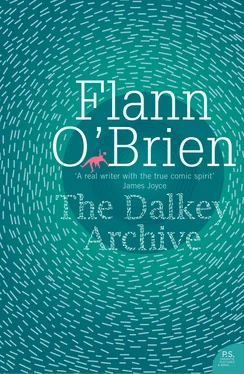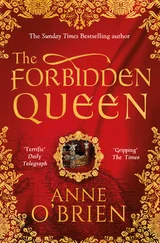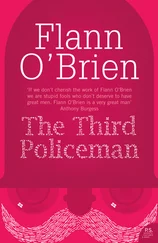– Yes.
Hackett was meditating on something.
– Funny thing, he said, I left a little bottle behind me in the Colza last night by accident. Perigastric thiosulphate, you know. My damned stomach is full of ructions and eructations.
– Well by damn, the sergeant sighed sympathetically, that is an infertile bitching. I cry for any creature, man or woman, who is troublous in the stomach enpitments. Mrs Laverty would be in her bed now or mayhap awash in her private bath internally.
– Brandy is good for a sick stomach, Mick ventured with studied tactlessness.
– Brandy? Baugh! Hackett grimaced.
– Not brandy but Brannigan, the sergeant cried, striking his crossbar. Brannigan the chemist, and he’s an early-Mass man. He would now be shovelling gleefully at his stirabout, and supinely dietetic. Come down along here now.
Glumly Mick followed Hackett’s downcast back as the sergeant led the way down the street to a corner shop and smartly knocked on the residential door. The small meek Mr Brannigan had scarcely opened it when they were all crowded in the hallway. Mick felt annoyed at this improvised and silly tactic. What would passers-by think of two bicycles outside at such an hour, with the sergeant’s the most recognizable in the whole country? Hackett might be forced to swallow a dose of salts rather than disavow his lie about digestion trouble, and good enough for him.
– I have a man here, Mr Brannigan, avic, the sergeant announced cheerfully, that has a raging confusion in his craw, a stainless citizen and a martyr. Let us make our way sedulously to the shop.
Mr Brannigan with vague noises had produced keys and opened a door in the narrow hall; then they were all in the shop, with its gaudy goods and showcases. Under the high ceiling Mr Brannigan looked tiny (or perhaps his nearness to the sergeant was the real reason), the face quite round, round glasses in it and an air of being pleased.
– Which of the gentlemen, Sergeant, he asked quietly, is out of humour with himself?
The sergeant clapped a hand officially on Hackett’s shoulder.
– Mr Hackett is the patient inexorably, he said.
– Ah. Where is the seat of the trouble, Mr Hackett?
The patient made a clutching motion at his stomach.
– Here, he muttered, where nearly everybody’s damn trouble lies.
– Ah-ha. Have you been taking anything in particular for it?
– I have. But I can’t tell you what. Something from a prescription I haven’t got on me.
– Well well now. I would recommend a mix of acetic anhydride with carbonic acid. In solution. Excellent stuff in the right proportions. I won’t be a minute getting it.
– No, no, Hackett said in genuine remonstrance. I daren’t take drugs I’m not used to. Very nice of you and the Sergeant, Mr Brannigan, but I can wait.
– But we’ve any amount of proprietary things here, Mr Hackett. Even temporary relief, you know …
But the sergeant had been examining a large bottle he had taken down from a low shelf by the counter.
– By the pipers, he cried happily, here is the elixir of youth innocuously in its mundane perfection!
He handed the bottle to Hackett and reached up for another which he put in Mick’s hand. The label was,
HURLEY’S TONIC WINE
A glass three times a day or as required assures lasting benefit to the kidneys, stomach and nervous system. As recommended by doctors, nurses and geriatric institutions.
– Mind you, that’s not a bad sedative for the inner man, Mr Brannigan said seriously. Many ladies in the town are very partial to it.
– Sir Thomas O’Brannigan, the sergeant intoned grandly, I will buy a bottle of it myself – put it down to me – and when you have emplaced delicate stem glasses we will all have a sup of it superbly, for the dear knows how sick we could all be in the heel of the day.
Mr Brannigan smiled and nodded. Hackett hastily examined their faces in the uncertain light.
– I suppose it would pull us together a bit, he conceded. I’ll have a bottle too.
That Sunday morning had been surely one of manicoloured travail. After acerb disputation between De Selby and Saint Augustine, here they were for at least an hour in that closed pharmacy drinking Hurley’s Tonic Wine and listening to Sergeant Fottrell’s pensées on happiness, health, the wonders of foreign travel, law and order, and bicycles. The tonic was, as one suspected it would be, a cheap red wine heavily fortified. Its social purpose was clear enough. It enabled prim ladies, who would be shocked at the idea of entering a public house, to drink liquor that was by no means feeble, in the defensible interest of promoting health.
Mick had also bought a bottle and they were in the midst of a fourth bottle which Mr Brannigan bad gallantly put up ‘on the house’ when Mick felt that sheer shame required that the little party should end. Hackett agreed that he felt much better but not so Mick; even genuine wine does not help much, and he felt a little bit queasy. The sergeant was quite unmoved, and undeterred in loquacity. When they were back in the street Mick turned to him.
– Sergeant, the day is getting older and more people are now about. Would you mind if I left this bike in your station till tomorrow? I think for me a tram home would be the business.
– Benignly certain, he replied, courteously. Tell Policeman Pluck that I ordained the custody unceremoniously.
He then departed about his public business with many blessings commending his friends to God.
– Do you know, Hackett mentioned as they moved off, all that Augustinian chat is gradually bringing half-forgotten things bubbling up in my head. Didn’t he have a ferocious go at Pelagius?
– The heretic? Yes.
– What do you mean heretic?
– That’s what he was. Some synod condemned and excommunicated him.
– I thought only the Pope could pronounce on heresy.
– No. He appealed to the Pope without result.
– I see. Other bad eggs were the Manichees and the Donatists. I know that. I don’t mind about them at all. But if my memory isn’t all bunched. I believe Pelagius was a grand man and a sound theologian.
– You don’t know much on the subject. Don’t pretend.
– He believed Adam’s lapse (and personally I wouldn’t take the slightest notice of such fooling) harmed only himself. The guilt was his alone and this yarn about everybody being born in original sin is all bloody bull.
– Oh, as you will.
– Who, believing in God, could also believe that the whole human race was prostrate in ruin before Christ came, the day before yesterday?
– Augustine, for one, I think.
– New-born infants are innocent and if they die before baptism, they have a right to heaven. Baptism is only a rite, a sort of myth.
– According to De Selby, John the Baptist was no myth. He met the man. He probably regards him as a personal friend.
– Are you baptized?
– I suppose so.
– Suppose so? Is a hazy opinion enough if your soul depends on it?
– For heaven’s sake shut up. Haven’t we had enough for today and yesterday?
– An awkward question, what?
– At this rate I’ll probably meet Martin Luther on top of the tram.
Hackett contemptuously lit a cigarette and stopped.
– I’ll leave you here, go for a walk, get a paper, sit down and read a lot of boring muck, and wait for a chance to slip into the Colza. But remember this: I’m a Pelagian.
Policeman Pluck was young, raw-boned, mottled of complexion and wore an expression of friendly stupidity. He had a bicycle upside-down on the floor of the day-room attending to a hernia at the front rim, grating white powder on to a protruding intestine. His salute for Mick was an inane smile in which his scrupulously correct uniform seemed to concur, though all visible teeth seemed to be bad and discoloured.
Читать дальше












